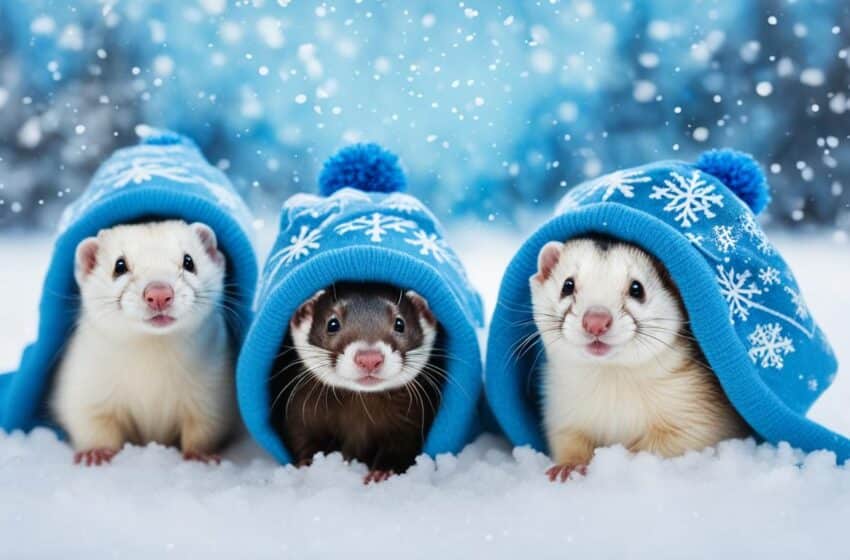Winter Wellness Tips for Ferrets

As temperatures drop during winter, it’s important to take extra care of your ferret’s health. Keeping ferrets healthy requires special attention in cold weather. Follow these winter wellness tips to ensure your furry friend stays happy and healthy during the colder months.
Key Takeaways:
- Provide a warm and cozy environment for your ferret by properly insulating their habitat and using cozy bedding.
- Consult with a veterinarian to determine the appropriate diet and feeding schedule for your ferret during winter.
- Engage your ferret in indoor exercise and mental stimulation activities to keep them active and prevent boredom.
- Regular grooming sessions, including brushing and nail trimming, can help maintain a healthy coat and prevent dryness.
- If you have any concerns about your ferret’s health during winter, consult with a veterinarian for expert advice.
Understanding the Risks of Cold Weather for Ferrets
During the winter months, cold weather poses several risks to the health and well-being of ferrets. These cold-related issues can range from mild discomfort to severe health complications if not properly addressed. As responsible ferret owners, it is essential to understand these risks and take necessary precautions to ensure the safety and health of our furry friends.
Ferrets are highly sensitive to cold temperatures due to their small size and lack of a thick layer of body fat. Exposing them to prolonged periods of cold weather can put them at risk of developing hypothermia, which is a potentially life-threatening condition. Hypothermia occurs when a ferret’s body temperature drops below a normal range, adversely affecting their vital organs and bodily functions.
In addition to hypothermia, cold weather can also lead to other health issues in ferrets, such as respiratory infections and weakened immune systems. When ferrets are exposed to cold and damp environments, their respiratory system becomes vulnerable to respiratory ailments, making them more susceptible to respiratory infections. Furthermore, the immune system of ferrets can be compromised in cold weather, making them more prone to various illnesses.
Preventing these cold-related risks requires taking appropriate winter precautions to provide a safe and comfortable environment for your ferret. Here are some essential measures you can take:
1. Provide Adequate Shelter
Ensure that your ferret has a warm and dry shelter to retreat to during cold weather. This can be a well-insulated ferret cage or a dedicated area inside your home that is free from drafts. Avoid placing the cage near windows or external doors, as these areas tend to be colder.
2. Use Warm Bedding
Choose bedding materials that provide insulation and warmth for your ferret. Soft blankets, fleece liners, or specially designed ferret beds can help retain body heat and keep your ferret cozy. Make sure to regularly clean and replace bedding to maintain cleanliness and prevent odor buildup.
3. Regulate Indoor Temperature
Use heating devices, such as heating pads or heated blankets, to maintain a comfortable temperature for your ferret. Keep in mind that overheating can also be harmful to your ferret’s health, so it’s important to monitor the temperature and adjust accordingly. A temperature range of 65°F to 75°F (18°C to 24°C) is generally suitable for ferrets.
4. Limit Outdoor Exposure
Avoid taking your ferret outside for extended periods when temperatures are extremely low. If you need to bring your ferret outdoors, ensure they are properly bundled up in a warm and secure carrier or harness to minimize exposure to the cold. Always supervise them closely and bring them back indoors if they show signs of discomfort.
5. Maintain Ferret Health
Optimize your ferret’s overall health by ensuring they are up to date on vaccinations and receive regular veterinary check-ups. A healthy ferret is better equipped to handle environmental stressors, including cold weather. Consult with your veterinarian for any specific recommendations regarding your ferret’s health needs during winter.
6. Monitor for Signs of Cold-Related Issues
Keep a close eye on your ferret for any signs of cold-related health problems, such as shivering, lethargy, loss of appetite, or difficulty breathing. If you notice any of these symptoms, seek immediate veterinary care as these could be indications of more serious issues like hypothermia or respiratory infections.
| Common Cold Weather Risks for Ferrets | |
|---|---|
| Hypothermia | Prolonged exposure to cold temperatures can cause a drop in body temperature, leading to hypothermia in ferrets. |
| Respiratory Infections | Cold and damp environments can make ferrets susceptible to respiratory infections, which can further compromise their health. |
| Weakened Immune System | Cold weather can weaken a ferret’s immune system, making them more susceptible to various illnesses. |
By understanding the risks associated with cold weather and taking appropriate precautions, you can protect your ferret from potential health issues and ensure their well-being throughout the winter season.
Maintaining a Comfortable Environment
Creating a warm and cozy habitat is essential for keeping your ferret comfortable during the winter season. Proper temperature control and cozy bedding are key factors in ensuring your ferret’s well-being.
Start by insulating the ferret’s habitat to protect them from the cold. This can be done by using materials like foam or insulation panels to line the enclosure walls. Insulation helps retain heat and prevents drafts, keeping the temperature stable.
When it comes to bedding, choose options that provide both warmth and comfort for your furry friend. Soft fabrics such as fleece or flannel are excellent choices for ferret bedding. These materials trap heat and help regulate body temperature, keeping your ferret snug.
If temperatures drop significantly, consider using additional heat sources to ensure your ferret stays warm. Heating pads designed for pet use or heated blankets placed under their bedding can provide extra warmth. However, it’s crucial to regularly monitor the temperature to prevent overheating or burns.

Remember, maintaining a comfortable environment is essential for your ferret’s well-being during the winter. By insulating their habitat, using cozy bedding, and providing additional heat when needed, you can create a cozy retreat for your furry companion.
Proper Nutrition and Hydration
During winter, maintaining a healthy and balanced diet for your ferret is essential to help them stay warm and energetic. Consult with a veterinarian to determine the appropriate ferret diet and feeding schedule based on their age, activity level, and specific health needs. Adequate nutrition will provide the necessary calories your furry friend needs to keep warm in colder temperatures.
Remember to consider the following when planning your ferret’s winter diet:
- Choose high-quality ferret food that is rich in animal protein. Avoid feeding them dog or cat food as it may not meet their nutritional requirements.
- Include a variety of fresh meat, such as chicken, turkey, and lean beef, in your ferret’s diet to provide essential nutrients.
- Offer small amounts of fruits and vegetables as occasional treats, but ensure they make up a small portion of their overall diet.
- Avoid feeding your ferret sugary or fatty foods, as they can lead to weight gain and other health issues.
Proper hydration is also crucial for your ferret’s well-being, even during the winter months.
Ensure your ferret has access to fresh water at all times. Dehydration can occur in colder months, especially if the indoor air is dry due to heating systems. Check the water bowl regularly to make sure it is clean and filled with fresh water. If your ferret prefers drinking from a water bottle, ensure that it is working properly and not frozen.
Gloomy weather and water consumption
During the winter, some ferrets may consume less water due to the gloomy weather and lower activity levels. To encourage proper hydration, you can try the following:
- Add a small amount of water to your ferret’s meals to increase their overall water intake.
- Offer wet foods or soups occasionally to provide additional moisture.
- Monitor your ferret for signs of dehydration, such as lethargy, dry gums, and reduced urination. If you notice these symptoms, consult with your veterinarian immediately.
By ensuring your ferret receives the right nutrition and has access to fresh water, you can help maintain their overall health and well-being during the winter season.
Exercise and Mental Stimulation
Indoor exercise and mental stimulation are crucial for the overall well-being of ferrets during winter. It’s important to provide them with opportunities for play and enrichment to keep their minds and bodies active.
Engage your ferret in interactive play sessions to fulfill their exercise needs. Some popular activities include using interactive toys that encourage hunting instincts, such as puzzle feeders or treat balls. These toys not only provide physical exercise but also mental stimulation as your ferret figures out how to access the treat inside.
Consider creating an enriched environment for your ferret by providing climbing structures, tunnels, and hiding spots. These additions to their living space can mimic natural habitats and provide opportunities for exploration and play. Remember to always supervise your ferret during playtime to ensure their safety.
Indoor Activity Ideas for Ferrets:
- Hide and Seek: Hide treats or toys around the house for your ferret to find.
- Tunnel Fun: Set up tunnels for your ferret to explore and run through.
- Obstacle Course: Create a mini obstacle course using cardboard boxes or tunnels.
- Fetch: Teach your ferret to fetch small toys and engage in interactive play.
- Digging Box: Fill a shallow box with safe materials like dried rice or small balls for your ferret to dig in.
Ferrets are intelligent animals and need mental stimulation to prevent boredom and destructive behavior. Providing them with a variety of toys and activities helps keep their minds occupied and mimics the challenges they would face in the wild.
Remember to rotate and introduce new toys and activities regularly to keep your ferret engaged and prevent boredom. By providing ample playtime and mental stimulation, you can help keep your ferret happy and healthy during the winter months.

Grooming and Skin Care
During winter, it’s important to pay attention to your ferret’s grooming routine and skin care. The cold weather can be harsh on their delicate coat, leading to dryness and irritation. By following these tips, you can help keep your ferret’s coat healthy and their skin moisturized.
Regular Grooming Sessions
Regular grooming sessions are essential for maintaining a healthy and clean ferret coat. Brushing your ferret’s fur helps remove any debris, loose hair, and prevent matting. It also stimulates the production of natural oils in their skin, promoting a healthy and shiny coat. Additionally, trimming your ferret’s nails regularly is crucial to prevent overgrowth and discomfort.
“Regular brushing and nail trimming are key parts of a ferret’s grooming routine, especially in winter when their coat tends to be drier.”
Moisturizing the Skin
To combat dryness and prevent skin irritation, consider using a ferret-specific moisturizer or a dry skin treatment recommended by your veterinarian. These products are specially formulated to provide hydration to the ferret’s skin, soothing any dry patches and promoting overall skin health. Before applying any products, consult with your vet to ensure they are safe for your ferret.
Remember to monitor your ferret’s skin condition closely during winter. If you notice any excessive dryness, flaking, or redness, it’s important to consult with a veterinarian for further guidance and potential treatment options.
Conclusion
By implementing these winter wellness tips, you can prioritize the care and well-being of your ferret during the colder months. Remember to create a warm and comfortable environment for them, ensuring their habitat is properly insulated and equipped with cozy bedding. Regularly monitor the temperature to maintain a safe and comfortable atmosphere.
In addition, pay close attention to your ferret’s nutrition and hydration needs. Consult with a veterinarian to determine the appropriate diet and feeding schedule. Keep fresh water easily accessible to prevent dehydration, which can still occur even in the winter.
Promoting exercise and mental stimulation for your ferret is equally important. Engage them in indoor activities, provide interactive toys, and create a stimulating environment to keep them active and mentally sharp.
Don’t overlook the importance of grooming and skin care during winter. Regular grooming sessions, including brushing and nail trimming, can help maintain a healthy coat. Should dry skin become a concern, consult with a veterinarian for suitable moisturizers or treatments.
Follow these winter wellness tips to provide your ferret with the best care, ensuring they stay healthy, happy, and vibrant throughout the cold weather season. If you have any concerns or questions, consult with a veterinarian for expert advice and guidance tailored to your ferret’s specific needs.
FAQ
Why do ferrets need special attention during winter?
Ferrets are sensitive to cold temperatures and can be at risk of hypothermia and other cold-related health issues.
How can I keep my ferret warm during winter?
Ensure their habitat is properly insulated, use bedding materials that provide warmth, and consider using a heat source like a heating pad or a heated blanket.
Do ferrets need a different diet during winter?
Ferrets may require additional calories to keep warm, so it’s important to consult with a veterinarian to determine the appropriate diet and feeding schedule.
Should I be concerned about dehydration during colder months?
Yes, it’s important to make sure your ferret has access to fresh water at all times, even during winter, as dehydration can be a concern.
How can I provide exercise and mental stimulation for my ferret indoors?
Engage your ferret in interactive play sessions, provide toys and climbing structures, and create an enriched environment to keep them physically and mentally active.
What can I do to prevent dry skin and coat in my ferret during winter?
Regular grooming sessions, including brushing and nail trimming, can help maintain a healthy coat. Consider using a ferret-specific moisturizer or a dry skin treatment recommended by your veterinarian.
How can I ensure the overall wellness of my ferret during winter?
By following these winter wellness tips, such as providing a warm environment, proper nutrition, regular exercise, and grooming, you can keep your ferret healthy and happy throughout the colder months.
Source Links
- https://www.leadertelegram.com/country-today/farm/livestock/staying-warm-with-wisconsin-mink/article_bae9dc14-ab06-11ee-886d-0fe0511b1ef9.html
- https://guernseypress.com/news/uk-news/2024/01/07/cold-health-alert-issued-with-flooding-set-to-continue/
- https://www.ttownmedia.com/news/national/japan-fm-says-tokyo-determined-to-support-ukraine/article_f0d296d9-6caf-5a0b-8150-b9f22ff5601b.html



